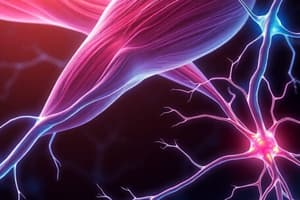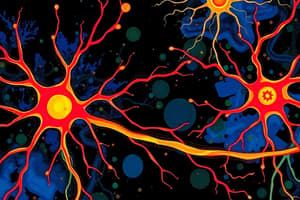Podcast
Questions and Answers
What is the primary function of skeletal muscle?
What is the primary function of skeletal muscle?
- Storing energy
- Regulating body temperature
- Facilitating body movements (correct)
- Transporting oxygen
Which of the following structures connect skeletal muscles to bones?
Which of the following structures connect skeletal muscles to bones?
- Cartilage
- Tendons (correct)
- Connective tissue
- Ligaments
What neurotransmitter is primarily involved in the neuromuscular junction of skeletal muscle?
What neurotransmitter is primarily involved in the neuromuscular junction of skeletal muscle?
- Acetylcholine (correct)
- Serotonin
- Dopamine
- Norepinephrine
Which characteristic describes myofibrils in skeletal muscle fibers?
Which characteristic describes myofibrils in skeletal muscle fibers?
Which of the following is NOT a characteristic of skeletal muscle?
Which of the following is NOT a characteristic of skeletal muscle?
What is the primary function of a neuron?
What is the primary function of a neuron?
What type of neuron is responsible for converting stimuli from the environment into electrical signals?
What type of neuron is responsible for converting stimuli from the environment into electrical signals?
Which neurons carry signals from sensory organs to the central nervous system?
Which neurons carry signals from sensory organs to the central nervous system?
What role do interneurons play in the neural communication process?
What role do interneurons play in the neural communication process?
What is the function of motor neurons in the context of sensory information?
What is the function of motor neurons in the context of sensory information?
What is a motor unit primarily composed of?
What is a motor unit primarily composed of?
Which statement best describes a nerve?
Which statement best describes a nerve?
Where are soma (cell bodies) primarily located?
Where are soma (cell bodies) primarily located?
What function do sensory neurons serve?
What function do sensory neurons serve?
What is NOT a component found within the soma (cell body)?
What is NOT a component found within the soma (cell body)?
What is the electrical potential difference across the cell membrane called when a neuron is not transmitting a signal?
What is the electrical potential difference across the cell membrane called when a neuron is not transmitting a signal?
In resting conditions, which ion can easily cross the neuron's cell membrane?
In resting conditions, which ion can easily cross the neuron's cell membrane?
What is the basic unit of muscle contraction known as?
What is the basic unit of muscle contraction known as?
What is the typical resting membrane potential for neurons?
What is the typical resting membrane potential for neurons?
How does the concentration of ions affect the resting membrane potential?
How does the concentration of ions affect the resting membrane potential?
Which characteristic allows a muscle to respond to stimuli?
Which characteristic allows a muscle to respond to stimuli?
What is the appearance of skeletal muscle fibers under a light microscope?
What is the appearance of skeletal muscle fibers under a light microscope?
Which type of muscle cell has the most negative resting potential?
Which type of muscle cell has the most negative resting potential?
What type of muscle property does elasticity represent?
What type of muscle property does elasticity represent?
Which component of a muscle fiber does not allow light to pass through?
Which component of a muscle fiber does not allow light to pass through?
What is the first phase of action potential?
What is the first phase of action potential?
What characterizes the absolute refractory period?
What characterizes the absolute refractory period?
What happens to the membrane potential during repolarization?
What happens to the membrane potential during repolarization?
At what membrane potential does the overshoot occur?
At what membrane potential does the overshoot occur?
During which stage does the membrane potential become more positive than the resting potential?
During which stage does the membrane potential become more positive than the resting potential?
What is required to trigger another action potential during the relative refractory period?
What is required to trigger another action potential during the relative refractory period?
What is the resting potential of cells approximately?
What is the resting potential of cells approximately?
What occurs during repolarization?
What occurs during repolarization?
What occurs after the repolarization phase?
What occurs after the repolarization phase?
Which stage of action potential occurs immediately after depolarization?
Which stage of action potential occurs immediately after depolarization?
What occurs during depolarization in an action potential?
What occurs during depolarization in an action potential?
Which characteristic describes the action potential's response to a stimulus beyond the threshold?
Which characteristic describes the action potential's response to a stimulus beyond the threshold?
What effect does hypercalcemia have on excitability?
What effect does hypercalcemia have on excitability?
During which step of the action potential do K+ channels open?
During which step of the action potential do K+ channels open?
What conditions would lead to increased excitability of nerve cells?
What conditions would lead to increased excitability of nerve cells?
What occurs during the process of repolarization?
What occurs during the process of repolarization?
During hyperpolarization, how does the membrane potential change?
During hyperpolarization, how does the membrane potential change?
Which ions are primarily involved in causing hyperpolarization?
Which ions are primarily involved in causing hyperpolarization?
What is the range of the membrane potential during hyperpolarization?
What is the range of the membrane potential during hyperpolarization?
Flashcards
What is contractility of muscles?
What is contractility of muscles?
The ability of a muscle to shorten when stimulated.
What is a sarcomere?
What is a sarcomere?
The smallest functional unit of a muscle fiber.
What is extensibility of muscles?
What is extensibility of muscles?
The ability of a muscle to be stretched or lengthened.
What is excitability of muscles?
What is excitability of muscles?
Signup and view all the flashcards
What is elasticity of muscles?
What is elasticity of muscles?
Signup and view all the flashcards
Muscle
Muscle
Signup and view all the flashcards
Skeletal Muscle
Skeletal Muscle
Signup and view all the flashcards
Myofibril
Myofibril
Signup and view all the flashcards
Neuromuscular Junction
Neuromuscular Junction
Signup and view all the flashcards
Acetylcholine
Acetylcholine
Signup and view all the flashcards
What is a motor unit?
What is a motor unit?
Signup and view all the flashcards
What is a nerve?
What is a nerve?
Signup and view all the flashcards
What is the soma?
What is the soma?
Signup and view all the flashcards
What are sensory neurons?
What are sensory neurons?
Signup and view all the flashcards
What is the function of motor neurons?
What is the function of motor neurons?
Signup and view all the flashcards
Absolute Refractory Period
Absolute Refractory Period
Signup and view all the flashcards
Relative Refractory Period
Relative Refractory Period
Signup and view all the flashcards
Depolarization
Depolarization
Signup and view all the flashcards
Resting Potential
Resting Potential
Signup and view all the flashcards
Overshoot/Peak Phase
Overshoot/Peak Phase
Signup and view all the flashcards
Repolarization
Repolarization
Signup and view all the flashcards
Peak Potential
Peak Potential
Signup and view all the flashcards
Hyperpolarization
Hyperpolarization
Signup and view all the flashcards
Resting Membrane Potential
Resting Membrane Potential
Signup and view all the flashcards
Why is a resting neuron negative?
Why is a resting neuron negative?
Signup and view all the flashcards
Ion permeability in a resting neuron
Ion permeability in a resting neuron
Signup and view all the flashcards
Neuron
Neuron
Signup and view all the flashcards
Resting potential in different cells
Resting potential in different cells
Signup and view all the flashcards
Typical resting potential of neurons
Typical resting potential of neurons
Signup and view all the flashcards
Sensory Neuron
Sensory Neuron
Signup and view all the flashcards
Motor Neuron
Motor Neuron
Signup and view all the flashcards
Interneuron
Interneuron
Signup and view all the flashcards
Electrical Signal
Electrical Signal
Signup and view all the flashcards
Action Potential
Action Potential
Signup and view all the flashcards
Stimulus Threshold
Stimulus Threshold
Signup and view all the flashcards
Ion Channel
Ion Channel
Signup and view all the flashcards




